A laboratory for social innovation: Resilience and recovery in Ukraine
The war in Ukraine has showcased the resilience of the Ukrainian people and made the country a living laboratory where new models of social development can be conceived and tested.
It was a frosty morning in February 2022, and dark clouds hung overhead. On this otherwise normal winter day, Ukrainians woke to news they had long dreaded. Russia had launched a full-scale invasion, and though its forces were still hundreds of miles from the city of Lviv, the life of its residents had already changed. Eventually, the war would reach this medieval city in Ukraine’s far west. Missiles would rattle its buildings, but its people have remained unshakeable. On that Thursday morning, students at Ukrainian Catholic University (UCU) woke up and went to class, and they have been doing it ever since. In times of war, the university’s role is even more essential. Academic research has helped document Ukrainians’ resilience in the face of adversity, and it seeks to lay the foundation for a recovery that ensures freedom and prosperity for the next generations.
Resilience in action
When air raid sirens are still ringing through the air, academic research might seem like an idealistic pursuit. But it plays an important role in building knowledge and envisioning the future.
In the earliest days of the war, a Russian military convoy rolled toward Kyiv, and Vladimir Putin seemed to believe that resistance would be futile. He was quickly proven wrong, and Ukrainians repelled the Russian Army’s advance on the capital. The strength of Ukraine’s resistance surprised some, but it cannot be attributed to military acumen alone. Ukrainians self-organized and pulled together to support each other in a time of dire need. From the very first hours, they demonstrated resilience, and they have continued to do so.
Lviv is the westernmost of Ukraine’s major cities and has been a crossroads of Europe for centuries. As more than six million Ukrainians fled the war, many passed through the city on their way to nearby Poland and other countries beyond. It was Europe’s largest mass migration since the Second World War, and the residents of Lviv pulled together to facilitate the refugees’ safe passage.
UCU law students self-organized to provide legal advice, and social scientists recorded refugee testimonies for posterity. City residents stepped up to host migrants in their homes, too. Responses like this, which demonstrate a collaborative and hospitable spirit in immensely challenging circumstances, could hold lessons for how to manage crises elsewhere.
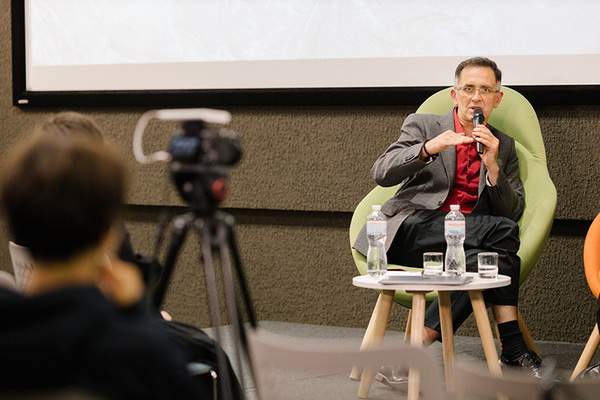
“Ukraine is a huge, open-air social laboratory. From a research viewpoint, there is an experiment happening on a huge scale, which no one would ever design intentionally — or even imagine,” says Volodymyr Turchynovskyy, the Dean of the Faculty of Social Sciences at UCU.
When air raid sirens are still ringing through the air, academic research might seem like an idealistic pursuit. But it plays an important role in building knowledge and envisioning the future. Citizenship and freedom are long-term projects, and there are no shortcuts; yet, the current context presents an opportunity to build a culture based on good ideas and sound principles. That makes working with the University of Notre Dame’s Keough School of Global Affairs a natural fit to partner with UCU. Keough is committed to research in democracy, sustainability, peacebuilding, and conflict resolution.
Since the start of the war, Notre Dame has been working even more closely with UCU to help it meet Ukraine’s research needs. Through the Nanovic Institute for European Studies, Notre Dame has supported collaborative research projects, hosted visiting scholars in South Bend, and organized a summer school with the Catholic University of Croatia that brings together students from UCU and other Catholic universities.
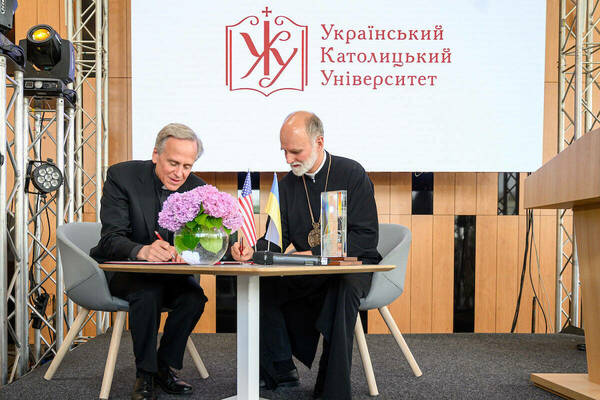
The formal relationship between these institutions dates back to 2004 when Notre Dame’s Nanovic Institute began working with Catholic universities in Eastern and Central Europe through the Catholic Universities Partnership (CUP). This partnership began as an initiative to foster mutual support between Notre Dame and Catholic higher education institutions and civil society organizations in post-Soviet countries, but CUP has stayed relevant in an evolving and unpredictable geopolitical context.
The organization’s 2022 meeting was held in Tbilisi, Georgia, and zeroed in on the topics of resilience and recovery. At the event, CUP’s members decided to publish a new special issue journal titled “Resilient Universities.” Led by UCU, the new publication will be released in late 2023 or early 2024 and will draw on the breadth of scholarship at its member institutions to dive more deeply into these themes. “Resilient Universities” will shed light on some of the ways that universities can meet adversity with resilience — and how to ensure the recovery from this conflict is sustainable and democratic when the time comes.
“Academically, there is a unique opportunity to explore new approaches and think about the future of democracy. Of course, we are concerned about our own future, but this goes beyond Ukraine,” says Turchynovskyy.
“There are real-life, everyday situations that should be studied and recorded. At some point, they will be of great importance. And we are studying this to the extent we can, but there needs to be an international effort.”
Today’s resilience shapes tomorrow’s democracy
Resilience is the ability to maintain integrity, even under adverse circumstances. And it is needed on multiple levels. Resilience research began with studies of individuals and expanded to consider families, institutions, communities—even democracies. This is what is being tested in Ukraine today.
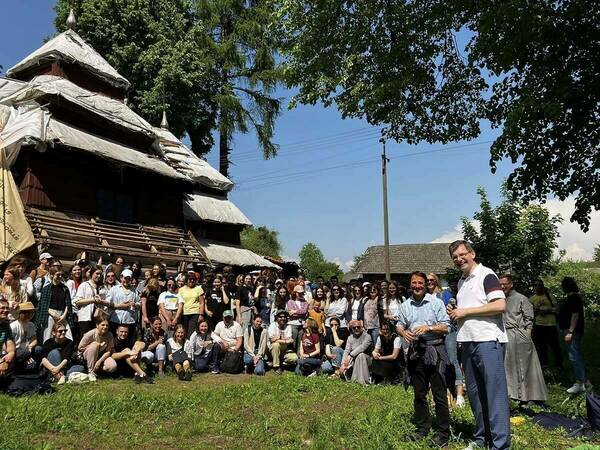
“At the individual level, the most important aspect is really internal. Is there a sense of direction? Is there a value base? Are there sources of inner strength?” says Clemens Sedmak, the director of the Nanovic Institute for European Studies.
Yet as the scale expands, practice becomes more important. For institutions, the way infrastructure is designed is key. In such trying times, both personal and institutional resilience are needed. That’s why the Nanovic Institute has explicitly set its strategic priorities to direct research efforts to the places where resilience is needed most.
“We looked to Pope Francis when we developed our strategic plan, and he has repeatedly talked about taking the ‘peripheries’ seriously,” says Sedmak. “Ukraine fits this definition. It is between Europe and Asia, and western Europe and eastern Europe.”
The country’s democracy is under siege, its history is complex, and its circumstances exceptional. Russia’s invasion of Ukraine has global implications for freedom and democracy. It changes the entire landscape of global security and highlights the need for long-term thinking about how to build institutions that will foster peace and freedom for decades to come.
“My question to myself and my colleagues is how can we preserve this moral energy? How can we sustain what we now have in abundance, and make a reservoir of it for the future? We need to keep this going, use it wisely, and build it into a culture of life.”
Volodymyr Turchynovskyy
For Turchynovskyy, the current situation fits into a broader historical sweep, which illustrates why it’s important to recognize the important role that faith can play in building resilient institutions.
“I wish that we, as younger generations of Ukrainians and Europeans, had had the capacity to think through decades, backwards and forwards, about what really matters—especially moral issues,” says Turchynovskyy. “This war is not just about the land. It is not just about resources. This should be named and understood as evil versus good. If you think along these lines, you can unfold that history back to the Second World War.”
Nazi fascism was an inhumane ideology that inflicted immense human suffering across Europe, and Ukraine wasn’t spared. Millions of Ukrainians were persecuted or killed. Soviet influence held sway in the decades that followed and inflicted additional suffering. Ukrainians’ religious beliefs were suppressed under communist rule, and when the Cold War ended, the West hoped that the market economy would be a path forward. But that has not worked out as planned, as Russia’s invasion has reminded us. Yet through it all, Ukrainian Catholics found ways to practice their faith. The underground churches people attended under Soviet rule were a source of strength from which many Ukrainians draw their resilience today, allowing them to keep fighting for their freedom and democracy.
“When you think through the immensity and depth of what we experience each day, it empowers you,” Turchynovskyy says. “You discover your strength and the power to keep moving. Human resilience is so connected to the ability to believe. Every day would be disastrous if you lost access to the transcendent. When we go back to business as usual, there is a risk you lose these moral and spiritual sensibilities. My question to myself and my colleagues is how can we preserve this moral energy? How can we sustain what we now have in abundance, and make a reservoir of it for the future? We need to keep this going, use it wisely, and build it into a culture of life.”
The next chapter: Envisioning and building the future
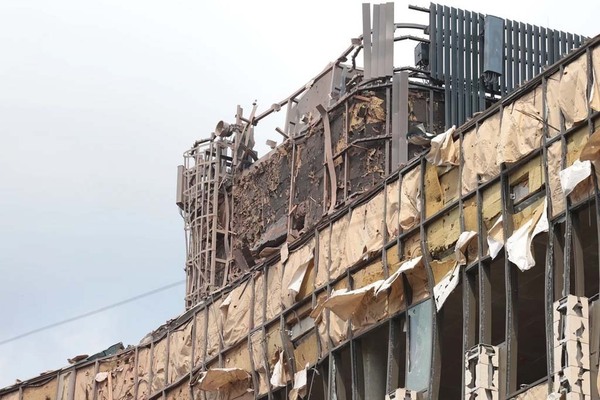
Lviv was largely spared from Russia’s initial onslaught, but over time, the war left its mark. Many UCU students, faculty, administrative staff, and alumni volunteered to serve, including more than 40 members of Turchynovskyy’s department alone. Some students are in active combat, and even self-organized volunteer battalions at the beginning of the war. Others are serving in medical or logistical roles. Inevitably, members of the university community have been killed in action. Russian missiles even struck buildings near campus on July 6, 2023, but UCU has continued to provide on-site courses and education.
“The war can sometimes be very close,” says Turchynovskyy. “But we’ve tried to preserve security and safety at the university to help students and faculty through this difficult time. In war, we must do what is most needed, and for us that has included remaining faithful to the university format and mission.”
A new undergraduate course called “Road to Recovery” is one way the university is doing this. It is an English-language offering delivered by UCU’s Business School and Social Sciences Faculty on-campus in Lviv, and it brings together Ukrainian scholars and academics from some of the world’s leading universities. Under the guidance of international experts like the Nanovic Institute’s Clemens Sedmak, students research the specific challenges Ukraine faces and devise methods and models to solve them.
“There are many high-class international experts and professors. They support Ukraine and want to share their expertise,” says Sophia Opatska, the Vice-Rector of UCU and founding Dean of the UCU business school. “For us, it’s important that our students have an opportunity to work with such people on concrete initiatives. We have already formed a number of projects in areas such as postwar reconstruction, the use of artificial intelligence, and architecture of national security.”
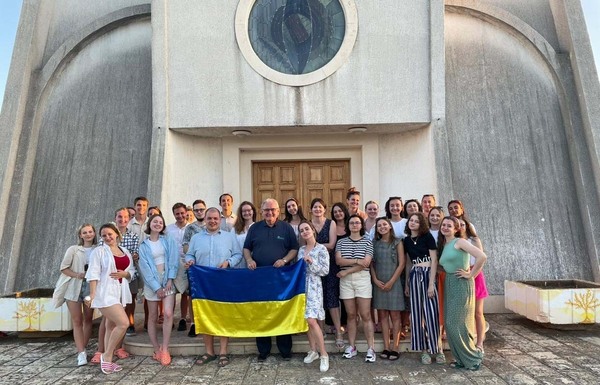
In the summers of 2022 and 2023, a summer school in Croatia on “Practicing Resilience, Preparing for Recovery” provided some UCU students with temporary relief. The program was offered in partnership with the Catholic University of Croatia and Notre Dame, and made possible with generous funding from organizations such as the United States Conference of Catholic Bishops’ Subcommittee on Aid to the Church in Central and Eastern Europe. The initiative brought together 20 Ukrainian students and an almost equal number of students from the other institutions that form the Catholic Universities Partnership. Notre Dame student Robert Batistich participated in the 2023 session and found it to be an eye-opening experience.
“When you hear about the war online or in the news, you only see it from afar, and can even become numb to it,” says Batistich.
“But when you speak with Ukrainian students, you realize they are living through it, and in spite of all that’s happened, they haven’t let it get them depressed. We were there to learn about building resilience, but it seemed like they had already built a lot of it over the past 18 months.”
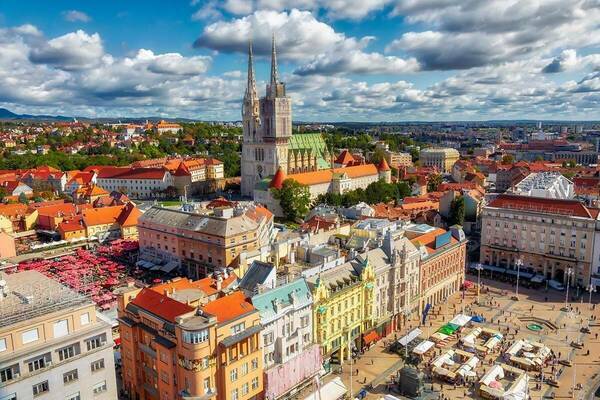
Even as the war continues at home, Croatia is a fitting place to consider what Ukraine’s recovery could one day look like. During the Croatian War of Independence in the 1990s, the country was the scene of gunfights and rocket attacks. But nearly 30 years after the last shots were fired, it has made substantial progress. The summer school has lecturers from Croatia who can talk about the war experience and a psychologist who could speak to the experience of families with veterans and psychological tendencies.
“They can speak about recovery in a very meaningful way,” says Sedmak. “Croatia’s experience of resilience during war and recovery afterward is powerful. There are photographs of what was destroyed in the 1990s, and today, you would not think for a split second that something really terrible had happened there.”
The war in Ukraine will end one day, too, and many who volunteered to fight will return to their homes and their families. Universities play a central role in preparing for their return. They not only need to envision how societies should be governed but must also anticipate future needs by ensuring there will be enough social workers, medical staff, engineers, and psychologists.
“We are asking ‘What makes such communities resilient?’ so that we can learn lessons for Ukraine and the world.”
Nataliya Yakymets
To this end, UCU has regular conferences and conversations with other universities and communities in Ukraine. Yet it is also important to collaborate with international partners and strengthen global partnerships so that lessons can be drawn from other experiences in healing the scars of war. UCU’s partnership with Notre Dame helps accomplish this. Notre Dame International awarded nine research grants for collaborations between researchers at Notre Dame and UCU. Three of these projects involve scholars at the Nanovic Institute, including “Strengthening and Understanding Resilient Institutions and Resilient Communities,” a project led by Sedmak and Nataliya Yakymets, assistant director for research at UCU’s International Institute for Ethics and Contemporary Issues.
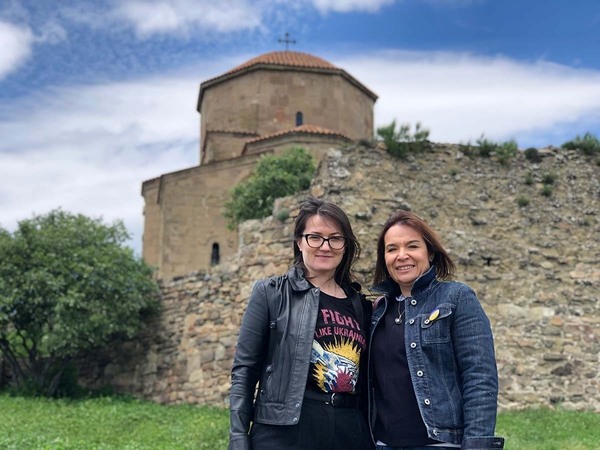
The project is an opportunity to understand resilience within social systems and institutions, including foster family systems and communities serving individuals with disabilities within Ukraine.
“We are asking, ‘What makes such communities resilient?’” says Yakymets. “So that we can learn lessons for Ukraine and the world.”
In summary, Turchynovskyy adds, “Running a university during wartime profoundly testifies as to how much academic life is sustained and enriched by solidarity and friendship. We hope our partnerships with Notre Dame and universities in Europe will generate practical ideas for how Ukraine might go through the recovery most efficiently.”
The success of this partnership owes much to the relationship that Notre Dame and UCU have been cultivating for decades. With the launch of the CUP in the early 2000s, the Nanovic Institute saw an opportunity to build relationships and support Catholic institutions as they processed the trauma of communist suppression.

“It has paid off tremendously that we didn’t have to start from scratch,” says Sedmak. “There were many expressions of solidarity with Ukraine, and many partners offered help, but we were already well-connected through this network. We had already built trust and relationships—friendships, really. That helped a lot for UCU to want to work with us in these circumstances.”
Originally published by at nanovic.nd.edu on November 29, 2023.
Latest Research
- ‘A special challenge’: German studies scholar wins National Humanities Center fellowship for research on medieval womenFor CJ Jones, the joy of research is not the answers but the journey. And the next step on that journey is a fellowship with the National Humanities Center. …
- Notre Dame Lead Innovation Team partners with local WIC program to identify, prevent lead poisoning in childrenB.A.B.E. store “shoppers” now have something new to help their families: free lead screening kits offered by the University of Notre Dame’s Lead Innovation Team.
- Notre Dame Welcomes Ninth Cohort of Warrior-Scholars for Transformative Academic JourneyNOTRE DAME, IN – The University of Notre Dame recently concluded its ninth successful Warrior-Scholar Project (WSP) boot camp, hosting 34 dedicated Warrior-Scholars from June 21st to 28th. This intensive, week-long academic residency provided transitioning service members and veterans…
- Entrepreneurship and Empowerment in South Africa study abroad program celebrates 25 yearsThis year, the Entrepreneurship and Empowerment in South Africa (EESA) program marked its 25th year of operation. EESA is a six-week summer study abroad program that enables students to help historically…
- Vatican honors Martin and Carmel Naughton with papal awardCarmel…
- Brain tumor growth patterns may help inform patient care managementAssistant Professor Meenal Datta (University of Notre Dame/Wes Evard) A team of researchers from the University of Notre Dame, Harvard Medical School/Massachusetts General Hospital, and Boston University has developed a technique for measuring a brain tumor’s mechanical force and a new model to estimate how much brain tissue a patient has lost.













